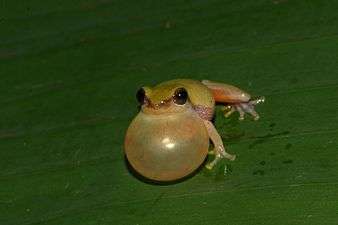Raorchestes akroparallagi
Raorchestes akroparallagi (sometimes known as the variable bush frog) is a species of frogs in the family Rhacophoridae.
| Variable bush frog | |
|---|---|
 | |
| Scientific classification | |
| Kingdom: | Animalia |
| Phylum: | Chordata |
| Class: | Amphibia |
| Order: | Anura |
| Family: | Rhacophoridae |
| Genus: | Raorchestes |
| Species: | R. akroparallagi |
| Binomial name | |
| Raorchestes akroparallagi (Biju and Bossuyt, 2009) | |
| Synonyms | |
|
Philautus akroparallagi Biju and Bossuyt, 2009[2] | |
It is endemic to the Western Ghats, India, where it is known from the states of Kerala and Tamil Nadu. Before its description in 2009, it was confused with Raorchestes femoralis and Raorchestes glandulosus.[3]
Description

Male Raorchestes akroparallagi are small, 19–22.5 mm (0.75–0.89 in) in snout-vent length, whereas females are larger, 26–27 mm (1.0–1.1 in) long. It is one of predominantly green Raorchestes. However, the colouration of its dorsum (back) is highly variable even within a single location, from almost uniformly green to various colours and markings. Indeed, its specific name, akroparallagi, is derived from Greek words akro, meaning 'extreme' and parallagi, meaning 'variation'.[2]
Reproduction
Raorchestes akroparallagi has direct development, with all growth inside the egg and no free-swimming tadpole stage. Males attract females with their calls. Mating takes place during the night. A pair in amplexus may move around before settling on a leaf and starting to lay eggs on its upper side. Egg laying takes hours and results in a clutch of 20–41 eggs. Eggs are white, about 4.4 mm (0.17 in) in diameter, and hatch after four weeks as fully developed froglets. There is no parental care.[4]
Habitat
Raorchestes akroparallagi is relatively widespread and occurs in a wide range of habitats and can live in disturbed habitats. It is found in evergreen forests to plantations near forest fringes and in roadside vegetation.[1][2] IUCN does not considered it threatened.[1]
References
- IUCN SSC Amphibian Specialist Group (2012). "Raorchestes akroparallagi". IUCN Red List of Threatened Species. 2012: e.T186158A1810433. doi:10.2305/IUCN.UK.2012-1.RLTS.T186158A1810433.en.
- Biju, S. D.; Bossuyt, F. (2009). "Systematics and phylogeny of Philautus Gistel, 1848 (Anura, Rhacophoridae) in the Western Ghats of India, with descriptions of 12 new species". Zoological Journal of the Linnean Society. 155 (2): 374–444. doi:10.1111/j.1096-3642.2008.00466.x.
- Frost, Darrel R. (2013). "Raorchestes akroparallagi (Biju and Bossuyt, 2009)". Amphibian Species of the World 5.6, an Online Reference. American Museum of Natural History. Retrieved 8 November 2013.
- Biju, S. D. (2003). "Reproductive mode in the shrub frog Philautus glandulosus (Jerdon, 1853) (Anura: Rhacophoridae)" (PDF). Current Science. 84 (3): 283–284. (N.b. This article predates the description of Raorchestes akroparallagi, and at that point the species was confused with Raorchestes glandulosus — see Biju & Bossuyt, 2009, p. 392.)
External links
| Wikimedia Commons has media related to Raorchestes akroparallagi. |

